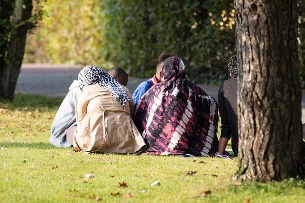Eritreans vulnerable at home and in Switzerland
Arbitrary arrests and detentions, harsh prison conditions, no freedom of religion or expression – there are many reasons why Eritreans come to Switzerland, says a UN authority.

(Keystone)
“The economic situation is not very good in the sense that they don’t see any future for themselves in the country,” Sheila B Keetharuth, the United Nations special rapporteur on the situation of human rights in Eritrea, said in an interview with Swiss public radio, RSI.
Some 4,000 people flee Eritrea every month, she said. About 20,000 live in Switzerland, home of Eritrea’s largest diaspora.
She also cited violations in the context of the national service, Eritrea’s form of military duty. Both men and women have to serve, and sexual abuse can be a problem.
“They are vulnerable to sexual advances – violations by commanders and peers,” Keetharuth said, adding that people doing their national service duty are often deployed to do non-military jobs, like working on farms or construction sites. It is unclear whether they are paid for this work.
The labour market has other faults as well, Keetharuth says. “People don’t have the right to choose which profession they want to do. Those are assigned by the government after grade 12.”
Yet few people dare complain about the situation.
“People are afraid to express their views. You can’t talk openly about arrest or detention because all information is controlled by the government,” Keetharuth said.
Questionable consular activities
As the newspaper NZZ am Sonntag reported on Sunday, the Eritrean consulate in Geneva makes refugees sign a “letter of regret” saying that they haven’t completed their national service – a crime with a prison sentence of two to five years. Eritreans in Switzerland also have to pay a 2% income tax to the Eritrean regime.
However, it’s cash that an unemployed Eritrean won’t have. According to the NZZ am Sonntag article, 90% of Eritreans in Switzerland receive welfare, and they end up pillaging those resources to satisfy the consulate in Geneva – in other words, Swiss funding for a regime with a questionable human rights record, pointed out the newspaper.
If the refugees don’t sign the regret letters or pay the income tax, they can’t return to Eritrea. However, people who have applied for asylum in Switzerland are not allowed to return to the country that they’re fleeing – otherwise they lose their status as asylum seekers.
As the NZZ am Sonntag reported, the Eritrean consulate encourages travellers to re-enter Eritrea with help from embassies in Italy, Egypt and Sudan so that the Swiss authorities don’t find out about the trips.
swissinfo.ch


![[AIM] Asmarino Independent Media](/images/logo/ailogo.png)